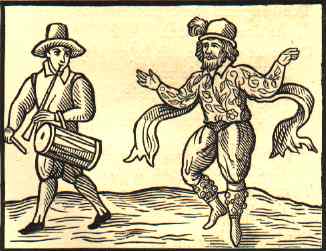Shakespeare's Actors (2)
Shakespeare's clowns
William Kempe* was one of the principal actors of Shakespeare's earlier plays, and one of the original shareholders in the Globe theatre. He left the company in 1599, possibly because of a dispute with Shakespeare*. Kempe specialized in broad clowning, and his parts most likely included Peter in Romeo and Juliet and Dogberry in Much Ado About Nothing.
Kempe was also famous for his dancing,* and between February 11 and March 11, 1600, he danced from London to Norwich, a feat known as "the nine days' wonder."
Robert Armin (c.1568-1615)
Listed as one of the "Principall Actors" in the Folio edition of Shakespeare's plays, Robert Armin was the comic actor who succeeded Will Kempe in 1599.
Robert Armin* was a more subtle comedian than Kempe had been, and possibly played the parts of Amiens or Touchstone in As You Like It, Feste in Twelfth Night and the Fool in King Lear. Armin was also a writer; his works include three jest-books, Phantasma, the Italian Tailor and his Boy (1609); Quips upon Questions; A Nest of Ninnies; and a play, The Two Maids of Moreclacke.
Footnotes
-
Kempe's early career
Will Kempe first appears as a member of the Earl of Leicester's entourage in the Low Countries in 1585, and soon after among the actors in Germany and Denmark (along with Thomas Pope and George Bryan). All three men were with Strange's Men in the early 1590s and then with the Chamberlain's Men later in the decade. (Contributed by David Kathman.)
-
Was Shakespeare attacking Kempe's improvisations?
Hamlet certainly did:
And let those that play your clowns speak no more than is set down for them, for there be of them that will themselves laugh to set on some quantity of barren spectators to laugh too, though in the mean time some necessary question of the play be then to be consider'd. That's villainous, and shows a most pitiful ambition in the fool that uses it.
(Hamlet, 3.2.38-45) -
Music for a dance
Listen to the music for one of his dances; the piece by the madrigalist Thomas Weelkes, and is called "When Kempe Did Dance Alone"...
-
Robert Armin
Robert Armin was born about 1568 in Lynn, Norfolk, the son of John Armin, tailor, though the exact date of his birth is not known. In October 1581 he was apprenticed to a London goldsmith, John Lonyson, for eleven years (making Armin about 13 at the time), but Lonyson died the following year, and Armin was then bound to John Kettlewood for nine years starting at Michelmas (spring) 1582. Some time in the next six years, though, Armin became a protege of the clown Richard Tarleton (who died in 1588) and also started to write satirical pamphlets. In the 1590s he was a member of Chandos' Men, with whom he toured the provinces before becoming a member of the Chamberlain's Men in 1599 upon the departure of Will Kempe. On January 27, 1604, he finally became free of the Goldsmith's Company, even though he was a full-time actor and author; this was most likely a purely economic decision, as freedom in a livery company bestowed many benefits. He died 1615.
